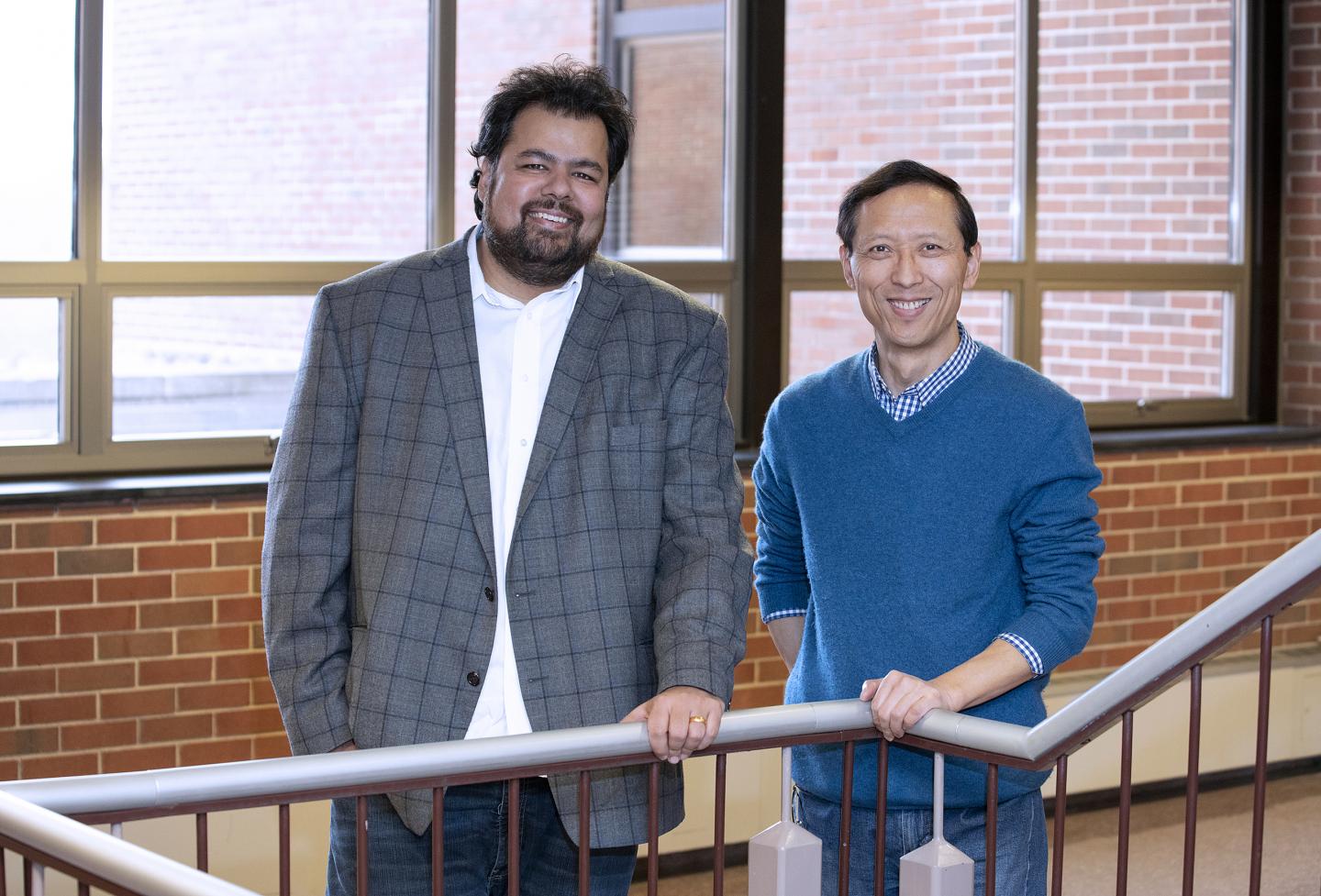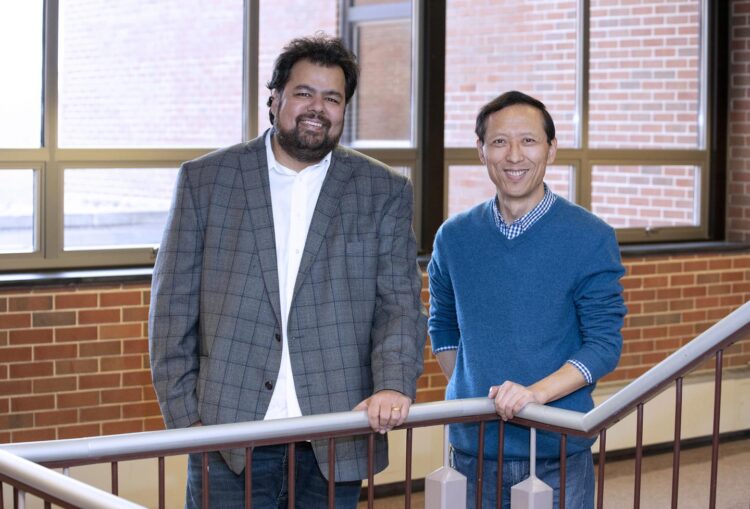
Credit: Ed Lausch, Lausch Photography
WEST LAFAYETTE, Ind. – Innovators at Purdue University have received new support as they work to develop solutions to what U.S. military officials call an alarming trend in dementia among wounded soldiers. The same researchers also seek solutions to better treat Alzheimer’s disease.
The Purdue team, including innovators from several disciplines across the university, received a $1.3 million grant from the Department of Defense for their work in this area.
“This project is highly relevant to the military, in that there is an alarming trend in the increasing reports of post-traumatic brain injury (TBI), Alzheimer’s disease and related dementia among wounded soldiers, imposing enormous emotional and economic burdens on military families, their communities and society as a whole,” said Gaurav Chopra, an assistant professor of analytical and physical chemistry in Purdue’s College of Science, who directs a laboratory in chemical immunology.
Chopra is the principal investigator leading the team, joining forces with Riyi Shi, a co-investigator on this grant.
Shi is a professor of neuroscience and biomedical engineering and director of the Center for Paralysis Research in Purdue’s College of Veterinary Medicine and Weldon School of Biomedical Engineering.
They are working with Purdue’s Bindley Bioscience Center; Purdue Center for Paralysis Research; Purdue Institute for Drug Discovery; Purdue Institute for Integrative Neuroscience; Purdue Institute of Inflammation, Immunology and Infectious Disease; Purdue University Center for Cancer Research; and Indiana University School of Medicine.
The work involves developing biomarkers and identifying new targets for phagocytic function of microglial cells, immune cells in the brain, in the context of brain injury-related Alzheimer’s disease and other dementia.
Chopra said brain tissue compression and damage can directly result from exposure to shock waves generated by explosive blasts to which soldiers are routinely exposed in combat and training exercises.
“Furthermore, intense combat conditions will also increase the incidence of traumatic brain injury in situations such as severe car accidents or accidental falls from varying heights,” Chopra said. “Therefore, uncovering the mechanisms responsible for this epidemic that detracts from the quality of life for thousands of veterans could profoundly benefit our soldiers who sacrifice a great deal to ensure our freedom.”
The current study will utilize new tools, such as, a pH-responsive Amyloid-beta and TBI-on-a-chip in vitro trauma model, along with well-established preclinical neurodegenerative and blast injury models developed in Chopra and Shi’s laboratories, to study microglial cell states in the context of TBI-related Alzheimer’s disease.
“Purdue features some of the most prominent trauma investigators and neuroimmunologists from around the world, and we are now merging this expertise together in an unprecedented symbiotic and focused manner to confront the epidemic of post-TBI mental abnormalities.” Shi said. “By bringing together a highly multidisciplinary team, we intend to not only improve our understanding of the mechanisms, but also diagnoses and treatments of TBI-related neurodegenerative dementia. The potential impacts of this study cannot be overestimated and could lead to immeasurable clinical and societal benefits.”
The Purdue team received the grant through the DoD’s Congressionally Directed Medical Research Programs partnership award program.
“The Purdue Institute for Integrative Neuroscience congratulates Gaurav Chopra and Riyi Shi for receiving this prestigious award from the DoD to support their research, which is closely aligned with the institute’s strategic initiatives in neurotrauma and Alzheimer’s disease,” said Chris Rochet, director of the Purdue Institute for Integrative Neuroscience.
###
The innovators have worked with the Purdue Research Foundation Office of Technology Commercialization on numerous technologies. The office is now housed in the Convergence Center for Innovation and Collaboration in Discovery Park District, adjacent to the Purdue campus.
About Purdue Research Foundation Office of Technology Commercialization
The Purdue Research Foundation Office of Technology Commercialization operates one of the most comprehensive technology transfer programs among leading research universities in the U.S. Services provided by this office support the economic development initiatives of Purdue University and benefit the university’s academic activities through commercializing, licensing and protecting Purdue intellectual property. The office recently moved into the Convergence Center for Innovation and Collaboration in Discovery Park District, adjacent to the Purdue campus. In fiscal year 2019, the office reported 136 deals finalized with 231 technologies signed, 380 disclosures received and 141 issued U.S. patents. The office is managed by the Purdue Research Foundation, which received the 2019 Innovation and Economic Prosperity Universities Award for Place from the Association of Public and Land-grant Universities. In 2020, IPWatchdog Institute ranked Purdue third nationally in startup creation and in the top 20 for patents. The Purdue Research Foundation is a private, nonprofit foundation created to advance the mission of Purdue University. Contact [email protected] for more information.
About Purdue University
Purdue University is a top public research institution developing practical solutions to today’s toughest challenges. Ranked the No. 6 Most Innovative University in the United States by U.S. News & World Report, Purdue delivers world-changing research and out-of-this-world discovery. Committed to hands-on and online, real-world learning, Purdue offers a transformative education to all. Committed to affordability and accessibility, Purdue has frozen tuition and most fees at 2012-13 levels, enabling more students than ever to graduate debt-free. See how Purdue never stops in the persistent pursuit of the next giant leap at purdue.edu.
Writer: Chris Adam, [email protected]
Sources: Gaurav Chopra, [email protected]
Riyi Shi, [email protected]
Media Contact
Chris Adam
[email protected]





